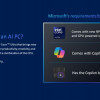Slackware vs OpenBSD (part 1)
Welcome dedicated fans! Please forgive any out-of-place numbers and/or missing white spaces ( ) in this article... Backslash, the normal enter, and space are all non-funtional at this time. I'm reduced to using alt-127 for backspace and alt-32 for space :( This is part 1 of a 2 part series compairing Patrick Volkerding's Slackware GNU/Linux O/S ver. 7.1 to Theo de Raadt's OpenBSD O/S ver. 2.8. Part 1 will deal with the origins of the two systems and cover some basic dis-similarities between them. In part 2 I will discuss more of there specific capabilities and recommended utilitization of such, and provide some usefull benchmarking results for the reader (you). Let's get started:
Slackware GNU/Linux v. 7.1:
Slackware was based upon one of the earliest distrobutions. Patrick Volkerding decided that, althoughit was a good O/S, It could use substantial improvment. What did he do? He created (IMONSHO) the best GNU/Linux distrobution to date (See Issue #5, Inside The Box).
Why is it the best Linux? Redhat and varients == severe insecurity/bloat/(R)edhat's(P)athetic(M)ess, Debian and varents == insecurity due to loose development team, SuSE n' such == Makes RH look small and secure. As for Slackware, we have fairly organized, close development team, the user base is encuraged to use the dedicated development forum, the pakage manager uses normal tarballs, your expected to configure aplications/daemons the way the application/daemon developer(s) meant you to (Sorry [Linux/Drak]Conf, and pre-customized KDE/GNOME), and best of all, all the included
applications (bloat) are not somehow integrated into the O/S. Sound like a rant? Well, get used to as many GNU/Linux O/S's you can get your hands on, and I can about guarantee you will agree with me. I have never seen a RH/SuSE system install nearly as quckly as a Slack before, and I DEFY anybody to prove me wrong. And no, comaring a minimal RH install to a max Slack doesn't count, equal packages only, or the default min, normal, or max installs. The newer Debian can beat
Slack I've heard, though. Deb is minimalistic w/ the bloat. And yes, obviously I am extremly biased. That is because nobody has ever been able to even remotly convince be that Slackware isn't the best, except for cases when the machiene is just a simple server, and it's not gunna be messed with. Then use Debian. Fu*k RedHat. WTF is this shit about it running out of file handles in 3 weeks? What simple minded rookie coded that funtion? And what idiot decided to include an extremly development gcc? If I wanted to *have* to d/l fixes for shit, I ould be using Windows NT. Thank you Patrick, for keeping Slackware standards-oriented, and impementing stable software. As such, Slackware was the one chosen for the compairason. Well, I think this little(little?) rant of mine pretty much covers what I think about Slackware, heh.
OpenBSD v. 2.8:
OpenBSD is based upon the source code for 4.4BSD-lite. OpenBSD's goals are primarily security and stablility, and they take it to an extreme. The base install is very minimalistic. It doesn't even ship with Nutscrape (not a bad thing...). There is X-Windows, however, and it comes with Fvwm. The basic tools one would expect are there, of course, and everything in the base install is checked rigorisly for security flaws. Combined with heavy criptography software such as
Kerberos, OpenSSH (of course), Blowfish, Apache's SSL mod included, etc... OpenBSD makes a fortified stable platform for almost any networking need. Also, if for some odd reason you do need something that not in the main distrobution, you can just go pick it up in the ports directory. There is still, however, a fairly sever lack of software, and OpenBSD has been benchmarked againsed Linux and other *BSD's, and it's disk I/O has almost reliably been slower. But keep in mind, OpenBSD
uses syncronis I/O by default for the sake of stability, but even with async turned on, it's still noticably slower.
Actual benchmarks and closer examination of each coming in part 2!
-- Liquid
1.) The Hack - JesterS
2.) The State of the Hack Awards #1 - MadSaxon
3.) Slackware vs OpenBSD (part 1) - Liquid Sphear
4.) Why Cryptography is Harder Than it Looks - Bruce Schneier
5.) Physics Utilizing Computer Technology or Computer Techology Utilizing Physics? (part 1) - Josette
6.) OsReview : Red Hat Linux 7.0 - L33tdawg









































































